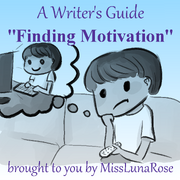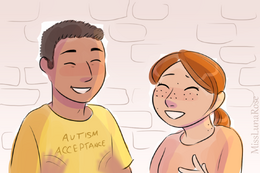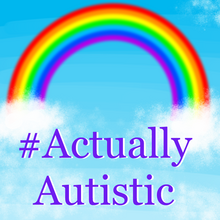My name is Luna Rose. I'm an autistic adult who writes and draws in my free time and works on creative, code-related projects at my job.
I first made "my story" here when I was a teenager. My goal then was to provide info of what autism can look like, without it coming from an organization that wants to scare you into giving them your money. I think it's important to remember that autistic people are diverse. There are autistic people who struggle much more than I do and those who struggle much less.
I'm not active on this site, but since this shows up on search engine results about me, I might as well keep it accurate.
Undiagnosed life[]
I was (un)lucky enough to not be diagnosed as a small child.
That doesn't mean I didn't display autistic traits. I wandered off in a mall around age 4 and unthinkingly gave my parents a huge fright. I spun in circles until I fell down giggling. I organized my toys and built Lego villages rather than playing with the characters. (I knew girls were supposed to play with dolls, but they were boring to me.) I cried and bit my arms at school assemblies because I was afraid of the loud noises that hurt my ears. I eventually figured out to make friends when I was around 8 years old. My handwriting was so bad that people knew my homework was mine, whether I had remembered to write my name or not. And I had an unusual interest in cats.
My parents considered me a "struggling gifted child" and figured I was just sensitive, introverted, and unique.

My special interest in writing turned into a series of tutorials about writing fiction.
My dad's good parenting instincts helped me have a good childhood. He didn't pressure me to "act normal" or pretend that things didn't bother me when they did. Instead, he encouraged my special interests, warned the family before he turned on the noisy blender, and let me enjoy harmless things like lining up my toys. That low-stress lifestyle helped reduce my difficulties in life.
Of course, then I started AP classes, moved across the country, and then went to college out of state. My sensory issues, as well as other issues, got much worse.
When I brought up sensory overload, a doctor told me she suspected I was autistic. I laughed it off and wondered why she could think such a thing. After I looked it up and learned from autistic people, I realized she knew what she was talking about. I sought and received an official diagnosis at age 18.
Post-diagnosis life[]
College[]
For me, the transition to adulthood wasn't just an uphill battle, but a crawl up a steep icy mountain dragging rocks by my ankles. My autism diagnosis woke me up to the fact that trying to live life neurotypically wasn't working.
I transferred to a different college closer to home with better disability services. I started stimming and unmasking more. Over the course of a year or two, my life transformed from "abysmal" to "decent." Eventually, I became very good at college once I had the rules and routines down.
Online volunteering helped me get back on my feet. I spent some time here, then moved to wikiHow due to its friendliness. I helped organize, rewrite, and expand the site's autism articles.
Working life[]
My first job was a low-paying job for a startup in my field of interest. My parents told me I was not being treated well there, but as an autistic person keenly aware of the unemployment rate for autistic college graduates, I wasn't sure a better place would take me. But I kept applying for jobs here and there.
Then I landed an interview somewhere. The place's website suggested a lighthearted, casual, and inclusive atmosphere. They liked my technical skills and the fact that I made them laugh in the interview.
I ended up on a team where I am not the only autistic person, which I'd never imagined happening. I have a flexible and friendly boss who lets me work remotely. I know what the expectations are, and by the numbers, I'm a top performer on my team. Naturally, I have my bad days, projects that go wrong and take forever to fix, and slip-ups. But I think I found a place that's good for me.
Advice[]
I've read about autism for the better part of a decade and lived an autistic life for over 2 decades. I don't know everything, but I'd say I have accumulated some knowledge by now.
You can read more of my advice on my blog.
For Autistic People[]
Life is going to involve challenges that many people won't understand. It's easy for them to conflate their molehills with your mountains. That doesn't mean that you're destined to be misunderstood or that you won't find your place someday.
Getting Help[]
- Find some good people. This might be family members, autistic friends, non-autistic friends, and/or a really good therapist. You know they're good for you if they help you feel brave, happy, and strong. You can come to them for advice and support.
- Make autistic friends. Autistic friends can be really helpful! They can teach you skills and help you feel better if you feel bad about yourself. Look for them at school, at disability groups, or on the internet.
- Speak up if someone is hurting you. Sometimes, people blame victims because it's easier than confronting the bully. But bullying doesn't happen because someone is "weird." It happens because the bully chooses to bully others. If someone doesn't take you seriously when you speak up, keep trying until you find the right person.

A doodle I made. It's okay to be yourself!
Living a happy life, not a "normal" life[]
- Stop worrying about "normal." You aren't normal. You're autistic. Worry less about fitting in and acting "socially appropriate," and start focusing on what makes you happy. What do you want? What is best for you?
- Refuse to let the world shame you for your needs. You can't do everything, and you shouldn't be expected to. It's all right to ask for help, and to get disability accommodations.
- Love your special interests. Special interests are a gift! They help you relax, feel confident, and gain important skills. Spend time on them, and consider a field of study or job that involves them.
- Get in touch with the Autistic community. Fellow autistic people can help you learn to cope, love yourself, and handle problems you face (from self esteem to replacing destructive stims).
Self Esteem[]
- Don't blame yourself. People might tell you that autism ruins everything. These people are bullies, and they say mean things because they're hurting inside. This isn't your fault. Try hard to love yourself, and get to know the autistic community.
- Talk to someone if it gets bad. Hating yourself, wanting to hurt yourself, or wanting to die is not normal.
- Meet the autistic community. There are lots of people like you. Look at ASAN, the Autism Women's Network, and Autism Acceptance Month (some of my favorites). These people care about you and want you to be happy.
(I'm doing my best to use plain language so that it's accessible to people who are young and/or intellectually disabled.)
For Parents and Caregivers[]
Your kid is going to face some major challenges. You can't change that fact. But you can control whether they have a safe, loving home to come back to. And in my experience, having one makes everything so much easier.
If you're still adjusting to this, I have a short story that may interest you.

You don't have to change your child in order to love and help them.
Helping[]
- Listen to your child. Not just words, either: the body language, the cries, and even the behaviors that frustrate you.
- Find a good therapist. Therapy isn't about training a kid to parrot non-autistic behavior. It needs to be about helping them regulate their emotions, face challenges, and find ways to be comfortable in the world. It should be a mostly fun/calm experience with no power struggles or stressful punishments. It also shouldn't overshadow your kid's ability to find downtime to relax and just enjoy childhood.
- Focus on skills, not normalization or compliance. Training kids to hide their autistic traits, known as "autistic masking," sets them up for mental health issues down the road. Training them to be obedient at any cost sets them up to let others mistreat them.
- Unacceptable behavior is unacceptable behavior. I quit wandering off and hiding away because (1) my dad firmly said no, and (2) he explained how much it scared him, and (3) I knew that "That scares me" means "that needs to stop" (whether I say it or he does). If the explanation doesn't stick, don't give up, and try to investigate why the kid acts this way.
- Don't overuse external motivators. Heavy reliance upon external motivators can lead to a drifting, powerless child. Try positive natural consequences, gentle praise, and respectful parenting strategies.
Ethics[]
Some people are going to tell you that ethics aren't important in working with autistic kids, because autistic people aren't real people until the autism is gone. I seriously question the wisdom of listening to those people.
- No means no. Except in cases of health and safety, your child should be able to say no. This is for a ton of reasons: fostering independence, reduction of anxiety, abuse prevention, and helping them listen to you. (If no means no when Abby says it, it then no must also mean no when Mommy says it.) If you have to override a no, try finding the cause and striking a deal to fix it, and/or explain why overriding this no is important. Make it clear that you still care about what they have to say.
- Trust your instincts. If something makes you uncomfortable, it's probably for a good reason. If someone tells you not to trust your instincts, they may not have your child's best interests in mind.
Self Esteem[]
- Encourage their strengths. Autistic people are people and they have strengths. Some will be related to autism (such as special interests), and some will be uniquely theirs.
- Celebrate their growth. Your child will learn in grow in many new ways. Help them recognize their accomplishments and feel proud of a job well done.
- Teach them it's okay to be autistic. Autism will be part of their everyday life for the rest of their lives. Do you want them to be ashamed of it?
Being Good to Yourself[]
- Don't blame yourself for their autism. It's mainly genetic, so even if things went "wrong" somehow during pregnancy, you didn't cause their autism. It's better to use your energy for helpful things and let your child see you make peace with it.
- Ask for help as you need it. While you shouldn't broadcast potty-training struggles using your child's full name, there are lots of other ways to get it. Talk to your friends, including parents of other autistic kids and your autistic friends. Get babysitters. Make an account under a pseudonym for #AskingAutistics why your child does something that worries or frustrates you.
- Take care of yourself. Part of being a good parent is having the energy to be a good parent. Take time to relax, take care of yourself, and allow yourself to adjust. Parenting isn't easy. Give yourself a break. No kid gets a perfect parent, but they should get a parent who does their best and forgives themselves for their mistakes.
Learning More[]

#ActuallyAutistic and #AskAnAutistic are great places to start.
Don't just take my word for this stuff. There are tons of wise and experienced people who can help you.
- Listen to autistic adults. They knew what it was like to grow up as an autistic child, and what worked and what didn't. They can help you. Give them a chance.
- Watch your sources. Some organizations (coughAutismSpeakscough) play upon parents' early fears, stating that autistic children and their families will have horrible terrible lives unless their organization gets more money. This is exploitative of families and deeply hurtful to the children. Be careful about the sources you consult, and use your judgment.
- Consider the autism acceptance movement. This movement of autistic people and their loved ones encourages support and an end to stigma. This helps (1) make the world more inclusive to autistic people, and (2) reduce self esteem issues in autistic people. You and/or your autistic loved one may benefit from the environment of inclusiveness and hope.
Websites to Start With[]
- Autism Acceptance Month: What is Autism?
- Autism Women's Network (check out the welcome packets!)
- ASAN: About Autism
- wikiHow's autism articles (scroll down for subcategories)
- My blog
